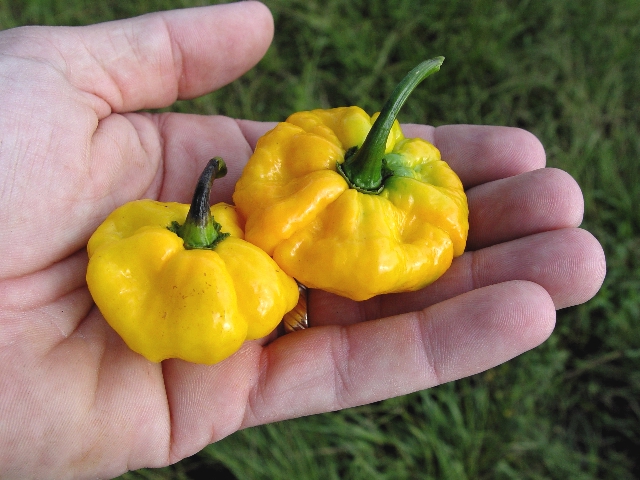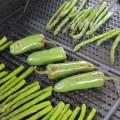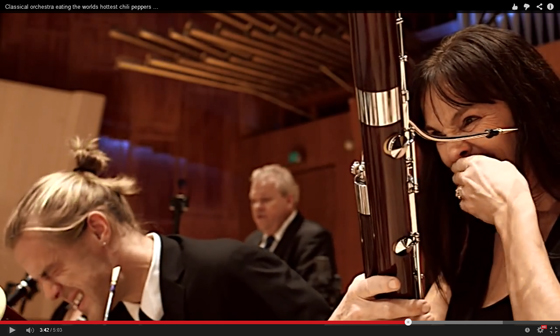“In Jamaica, much use is made of fresh peppers,” writes Norma Benghiat, author of Traditional Jamaican Cookery, “the most highly esteemed hot pepper being the ‘Scotch bonnet’, which has a wonderful perfume and flavour.” She adds, tantalizingly: “In recent times a Scotch bonnet pepper has been developed which retains the aroma and flavour, but is not hot.” According to another source, this mystery pepper, also called “seasoning pepper,” is mildly pungent and remains green, never maturing to orange or red.
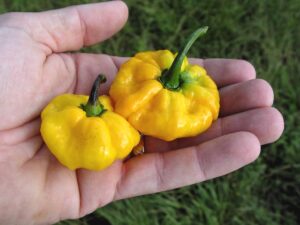
We tried to track down this pepper during several trips to Jamaica, and at first we thought we had found it: the “country pepper,” as it’s called. But the more we asked people to distinguish among the varieties, the more we became caught up in a confusion over names.
According to vendor Bernice Campbell in the Ocho Rios market, country peppers are more elongated than Scotch bonnets, and have more flavor. With a typical pepper contrariness, cook Betty Wilson disagrees. While serving us fricasseed chicken and grilled parrot fish at a stream- side picnic on the Rio Grande near Port Antonio, she claimed that Scotch bonnets are not as hot as country peppers but are more “flavored.” Our room attendant at Ciboney Resort, however, insisted that no, Scotch bonnets were hotter than country peppers. And habanero grower Graham Jacks wrote to us that “one of these country peppers is a deep brownish purple when ripe, and is truly ferociously hot; much hotter than the Scotch bonnet.”
To add to the confusion, a variety called Jamaican Hot occasionally appears in pepper literature. Author and chef Mark Miller, in his guide The Great Chile Book, describes it as “smaller than the habanero but similar in shape.” It is possible that this variety is the same as the West Indian Hot mentioned by Jean Andrews, but pepper importer Joe Litwin told us that the “hots” are generic terms used in the United States but not in Jamaica.
According to Litwin, who imports Jamaican peppers through his KAL International Company, there are two kinds of Scotch bonnet: One is green and matures to yellow; it is very common and is usually called Scotch bonnet. The other is a red pepper in the same shape, which is termed “country pepper.” Large, red, habanero-shaped pods are also called country pepper and are probably Congo pepper imports from Trinidad.
A search of the 1994 edition of Seed Savers Yearbook revealed common names of cultivated varieties to be Jamaica Large Red, Jamaica Orange, Jamaica Small Red, and the appellation Scotch bonnet with the descriptors “orange,” “yellow,” and “red” added. Not surprisingly, we remain confused about country peppers, seasoning peppers and Jamaica hots, but we have solved the country pepper mystery. On a subsequent trip to Jamaica, our guide David Brown told us that it would be confusing to ask Jamaicans to compare country peppers with Scotch bonnets because “Scotch bonnets are country peppers but not all country peppers are Scotch bonnets.” That momentarily baffled us, but he continued, “Country pepper is just a general term for garden peppers. Any cultivated pepper is a country pepper. That term distinguishes them from black pepper or pepper sauce.”
Joe Litwin, incidentally, started growing Scotch bonnets in Jamaica in 1991; he had previously cultivated organic sugar cane. He has twenty- five acres under cultivation in various parts of Jamaica and he also utilizes contract fields. There is no way to estimate total Jamaican production, Joe told us, but his company imports the fresh pods into the United States at the rate of three to four thousand pounds a week, and because of fears of drug loads being smuggled along with the peppers, Joe or one of his employees personally oversees the loading of every shipment of Scotch bonnets onto the plane. He also manufactures a line of products under the Jabeba House house brand, including Scotch Bonnet hot sauces in red and yellow, and jerk sauce.
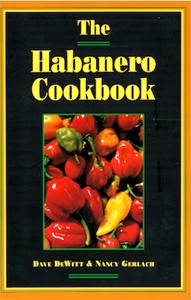
Editor’s Note: This excerpt comes to you from Dave DeWitt’s The Habanero Cookbook, which you’ll find hereEditor’s Note: This excerpt comes to you from Dave DeWitt’s The Habanero Cookbook, which you’ll find here.
Latest posts by Mark Masker (see all)
- 2024 Scovie Awards Call for Entries - 07/07/2023
- 2024 Scovie Awards Early Bird Special: 3 Days Left - 06/29/2023
- 2024 Scovie Awards Early Bird Deadline Looms - 06/25/2023

